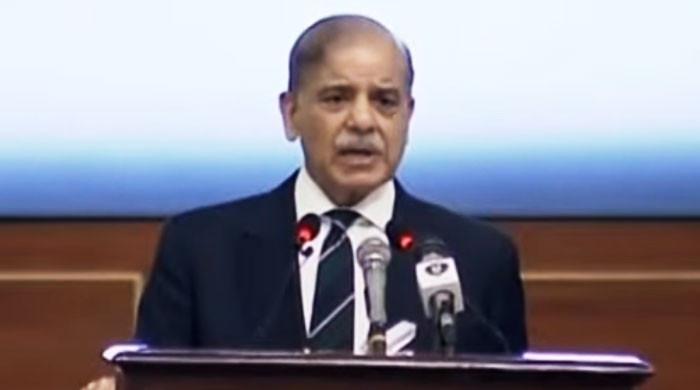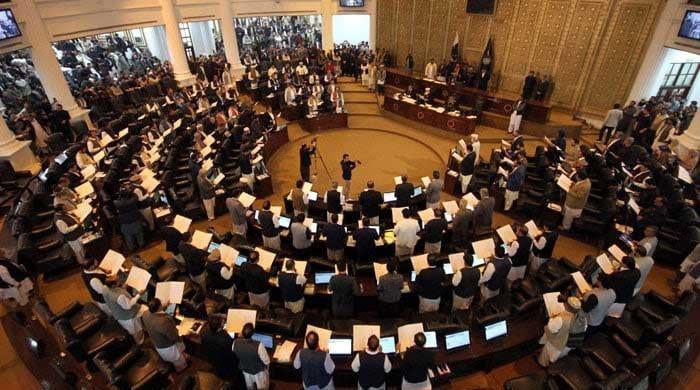Pakistan’s first opera singer takes message of spirituality to western audience
Saira says that classical training is always the key to learning music because it helps singers develop their stamina
September 03, 2018
LONDON: British Pakistani singer and songwriter Saira Peter has said that she created the genre of Sufi Opera to take the universal spiritual message of our Pakistani elders to a global western audience.
During an interview with Geo News, the Sufi Opear singer said that she merged Pakistan’s rich Sufi poetry with western classical music and produced Sufi Opera signing by featuring Asian inflections in her singing.
“When you look at it, the western opera is a powerful expression of western spiritual values. Opera examines the deepest issues of human existence through highly emotional music, so it is ideal for conveying our Sufi values of peace, tolerance and reconciliation.
Yet western and Pakistani classical singing are very different in nature. Pakistani classical vocal style permits sliding (portamento or meend), which is completely banned in western classical music.
If you slide between notes as a western classical singer. Your audience will think you don’t know how to sing in tune, but if you don’t slide when performing Pakistani classical, you omit all the beauty,” the singer explained at her home in London.
She spends her time between London, Pakistan and touring for concerts.
When in London, Saira Peter works at Noor Jehan Arts Centre (NJ Arts London), opened by British legend Sir Cliff Richard OBE in 1998. This centre specialises in giving training to students interested in learning western and Pakistani classical music.
She said: “The aim of NJ Arts is to promote social cohesion through creativity. I also happen to be its Director and NJ Arts is where I train students and organize cultural and educational events. We have done everything from hosting talent events for 10+ local schools at a time, to running the 3-day NJ Arts festival where winners received Noor Jehan awards, to launching Sufi Peace Fest at London City Hall [headquarters of London Mayor] which featured British celebrity artists and British and Pakistani ministers as guests.
I teach both western classical and Pakistani classical singing, depending on what students want. Some prefer pure classical while others are interested in becoming pop singers; some like jazz, but others specifically want ghazal or another Pakistani style.”
Saira explained that classical training is always the key to learning music because it helps singers develop their stamina.
“Once you know classical singing technique, then no matter what the genre is – be it jazz, ghazel, classical, thumri, etc – you will be at ease. Having a science background [Saira holds MSc Physical Chemistry], whenever I teach I draw attention to the fact that physiologically we sing through our body and organs, so it’s important that a singer knows the roles our organs play in producing sound, such as how we use the respiratory system, or how our bones resonate, to name just a few. Our body plays a big role in producing high or low notes, or in singing loudly or softly, or singing something fast or slow.”
The singer said that peace and reconciliation and unconditional love are what the whole world seeks, especially in times like these. “Our great spiritual leaders Shah Abdul Latif Bhittai, Baba Bulleh Shah and many others delivered this message centuries ago, and I am passionate about promoting these values through Sufi Opera. In fact, I am currently working on full-length Sufi Operas [dramatic and musical productions] based on the heroic stories of Mirza Sahiban and Umar Marwi (Shah Abdul Latif Bhittai).”
She recalled how at a recent concert in America the audience loved Sufi kalaam of Pakistani saints.
“I recently presented Latif’s spiritual message in Urdu “tairay ishq may jo bhi dhoob gaya” for thousands of university students during a US university lecture tour, the whole audience rose to their feet with a shout, and many jumped onstage and danced! There is just so much spirituality in our music, it surpasses language and goes straight to the heart.”
After hearing one of her live performances, the British Government’s Office for Nationality, Marriage in Hastings recently asked her to record the British National Anthem, “God Save the Queen”.
“I was honoured to be the first British-Asian bestowed with this privilege and I happily accepted, creating a special soprano version. It felt strange to discover soon after that my recording is being used for every British Citizenship ceremony in the 700 square mile East Sussex region. I was so privileged to record “God Save the Queen”, as every national anthem is the heart and soul of its nation. Some national anthems express the pain and struggle of their people, some even use four or five different languages, but the British national anthem, like that of Pakistan’s, is a unique prayer for peace and wellbeing. I have had so much encouraging feedback about this recording.”











